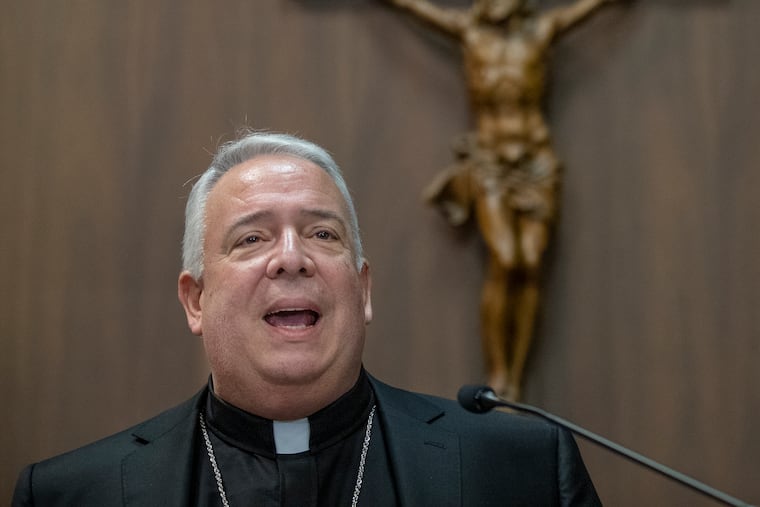‘A revolutionary idea’: Philly’s Latinos expect new archbishop Nelson Pérez to be a change agent
The announcement that Pope Francis had appointed the Cleveland bishop as Philadelphia’s new archbishop Thursday morning sparked joy and hope in Latino communities in the region, with most everyone expecting his appointment to have a significant impact on people here and abroad.

Yocasta Lora hadn’t been to church for about three years.
But the Dominican living in the Northeast had been a student of the Rev. Nelson Pérez — then a parish priest at St. Williams in Lawncrest — for a religion class at La Salle University, and she remembered him as charismatic. She wanted to hear him give an homilía in action.
It would be her first visit to a Roman Catholic church in the United States, and that experience eventually reconnected her with her faith and cultivated a new respect for religion. She said she was disappointed when he left for New York about eight years later in 2012.
“I still visit the Catholic Church, but I haven’t yet found a priest like him,” Lora, 39, said.
The announcement that Pope Francis had appointed the Cleveland bishop as Philadelphia’s new archbishop Thursday morning sparked joy and hope in Latino communities in the region as they expected his appointment to have a significant impact on people here and abroad. The 58-year-old of Cuban American background will be the first Hispanic to lead the Roman Catholic Archdiocese of Philadelphia, and one of three Hispanic archbishops in the country.
“It’s a great achievement for the community to have one in the faithful leadership,” said José Herrera Galán, 55, of Oxford Circle, who studies social ideology and is a political campaign adviser both here and in the Caribbean.
» READ MORE: A look at the career of Nelson Perez, Philadelphia’s next archbishop
Galán said Pérez’s appointment signals to cardinals and archbishops in Latin America and the Caribbean that the pope has “a revolutionary idea of younger, more liberal religious leaders that could eradicate conservatism in the hierarchy,” or en la cúpula. In those countries, this could be a push for more conscientious and fair interactions between the church and political leadership, Galán said.
He was interested to see how this would trickle down to Latin American countries, some of which still prohibit abortion and same-sex marriage. He also thought this would affect the internal structure of the church to give women more leadership possibilities, and allow priests to marry.
Pérez, born in Miami and raised in New Jersey, had served as a parish priest for more than two decades in West Chester and the Olney and Lawncrest sections of Philadelphia before being elevated to the hierarchy as an auxiliary bishop on Long Island.
Bishop Daniel Gutiérrez is the first Hispanic to lead the Episcopal Diocese of Pennsylvania and one of only two in a top position serving the Episcopal Church outside Latin America and the Caribbean.
Gutiérrez, who left the Roman Catholic Church to become Episcopalian, said this announcement marks an important “change of voice” in the church. The appointment of Pérez means Latinos are no longer an outreach project, second-class citizens, or people to minister to. Instead, they are “the church.”
“It is a blessing," he said. "It’s part of the wisdom of the pope of sending a shepherd into the field that reflects a community that is growing in Philadelphia and in the United States.”
Gutiérrez, who has never met Pérez, said he sees someone with whom he can work to heal divisions within Christianity. He hopes they can become “brothers,” and specifically help youth affected by poverty.
“I’m excited to meet him," Gutiérrez said, "have him introduce me to ropa vieja, speak in Spanish, and bond heart to heart and soul to soul.”
» READ MORE: Cleveland Bishop Nelson Perez has been named Philly’s next archbishop, replacing Charles Chaput
The Rev. Eduardo Montero was once the only Cuban clergyman in the Diocese of Philadelphia — until the day about 30 years ago when a colleague introduced him to the new priest in town.
Pérez had recently arrived in Philadelphia. The two quickly bonded over their shared love of Cuban food, as well as trips to Miami, a city they both visited often. Sometimes Pérez, a founding director for the Catholic Institute for Evangelization, asked Montero to help him by teaching a class there in Spanish. Montero, who works in the Tribunal of the Archdiocese and is also a pastor in Wynnewood, was in the audience Thursday as the archdiocese announced Pérez’s homecoming.
» Haga click aquí para leer este artículo en español.
“It’s a wonderful thing,” Montero said. “A wonderful thing for us all and for the Hispanic community, which is growing in such leaps and bounds.”
Israel Colón, 70, a longtime activist in Philadelphia’s Puerto Rican community, referenced the recent unprecedented growth among nondenominational churches in Philadelphia’s Latin communities, a result, he says, of Latinos seeking spiritual guidance in the wake of the Catholic Church’s sex-abuse scandals. An archbishop who speaks the language “of the most vulnerable and poverty-stricken sectors of our society” could help the church regain relevance in the community, Colón said.
Pérez is one of the leaders of V Encuentro, a process to find new ways to engage and strengthen Hispanic and Latino Catholics and address their pastoral needs, and traveled to the Vatican in September to present recommendations to Pope Francis. Pérez is also chairman of the U.S. Catholic Conference of Bishops Subcommittee on Hispanic Affairs and a member of the conference’s Working Group on Immigration.
Staff writer Allison Steele contributed to this article.